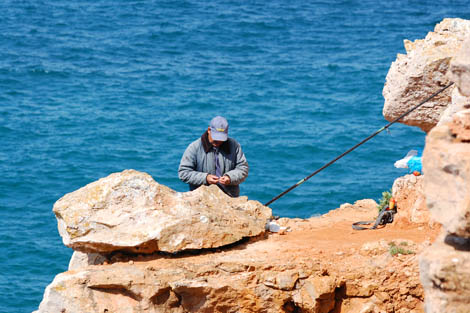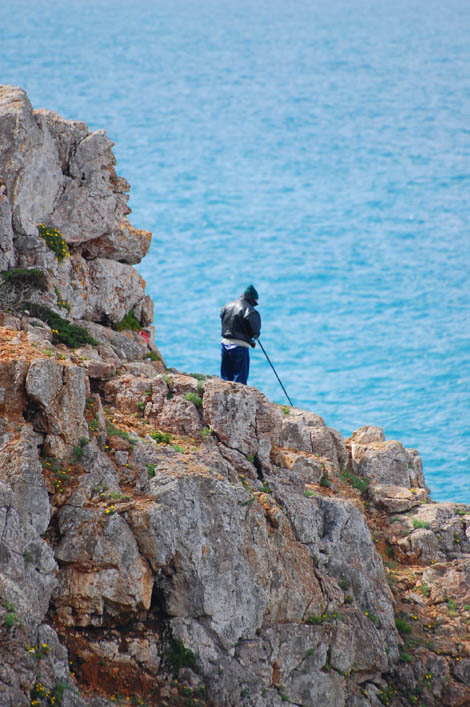 The new ordinance for recreational fishing in Portugal, published in Diário da República on 23 January, is considered a "victory" by David Rosa, one of the leaders of the Portuguese Coast Fishermen's Commissions.
The new ordinance for recreational fishing in Portugal, published in Diário da República on 23 January, is considered a "victory" by David Rosa, one of the leaders of the Portuguese Coast Fishermen's Commissions.
In statements to the Sul Informação, David Rosa, from Odeceixe, points out that the most significant changes «are related to the repeal of Ordinance 143», against which demonstrations were organized in Sagres, Odemira and Vila Nova de Milfontes.
Thus, he explained, with the publication of the Ordinance No. 14 / 2014, which regulates Decree-Law No. 101/2013, published on 25 July last year, «there is no longer any discrimination between Portuguese born and residents in the Natural Park of Sudoeste Alentejano e Costa Vicentina, who could fish in the area, and the remaining citizens, it is no longer prohibited to fish on Wednesdays, increase the amounts of fish and shellfish that recreational fishermen can catch, and the use of traditional utensils is now allowed».
David Rosa adds that the breech season, which ran from February 1st to March 15th, has also been abolished. With regard to quantities, he considers that the increase now defined “is positive and reasonable”. Thus, recreational fishermen can catch up to 2 kilos of barnacles, 3 of mussels and 10 of fish and cephalopods (octopuses, among others).
The Ordinance also defines an increase in the price of licenses. The license for recreational fishing on foot, for example, goes from 6 to 8 euros.
 According to the Ordinance, "this regulation moves towards administrative modernization and simplification of the procedures necessary to obtain and use the license", which "will now appear in an electronic record in the recreational fishing information system, maintained by the Directorate-General for Resources Natural, Security and Maritime Services, without prejudice to the possibility of issuing proof of this registration, in paper format, thus eliminating the risk of loss, theft or loss of the license».
According to the Ordinance, "this regulation moves towards administrative modernization and simplification of the procedures necessary to obtain and use the license", which "will now appear in an electronic record in the recreational fishing information system, maintained by the Directorate-General for Resources Natural, Security and Maritime Services, without prejudice to the possibility of issuing proof of this registration, in paper format, thus eliminating the risk of loss, theft or loss of the license».
But some restrictions remain: in Protected Areas with marine areas (Natural Park of Southwest Alentejo and Costa Vicentina, Arrábida Natural Park, North Coast Natural Park and Berlengas Nature Reserve), «in order to conserve biodiversity and establish a clear distinction between recreational fishermen and professional fishermen, recreational fishing on board within these areas is limited to 5 days a week, with the exception of the months of June to September».
The Ordinance brings together, "in a single list", the species whose capture or retention is prohibited in all types of recreational fishing, including in this list the technical grounds for the prohibition and new limits are established for the daily catches per person, equal in all national territory, defining specific catch limits for certain marine organisms'.
David Rosa stresses that «this victory is the result of a struggle that began four years ago and had its highest points in the gigantic demonstrations in Sagres, Odemira and Vila Nova Milfontes».
That playful fisherman emphasizes that "this movement has managed to remain active until now, thanks to the efforts of many men and women, and from here goes a special greeting to the populations of the Marinha Grande and Costa Vicentina and Southwest Alentejo", who revolted against the rules of the previous Ordinance No. 143.
However, David Rosa considers that, in the case of the Costa Vicentina Natural Park, there are still rules to be changed, which are not regulated by the Decree-Law and respective Ordinance, but by the Land Use Plan for that protected area.
This is the case of the restriction zones, «namely that of Rogil», which establish a strip of two kilometers of coast where recreational fishermen cannot be. “There has never been any study, any monitoring to substantiate this decision, which shows that that strip must be a reserve. In fact, studies by the University of Algarve indicate that recreational fisherman only represents a 0,2% impact on the stocks of species», he stresses.
David Rosa also said, in conclusion, that, with this new regulation and in particular with the end of the discrimination that prevented recreational fishermen who do not reside in the Natural Park area from fishing there, there could be "a positive economic impact in this region". Now there are conditions for the return of «all those people who were on vacation here in the area to fish».
The Portuguese Coast Fishermen's Commissions will hold several clarification sessions in all the centers along the Portuguese coast, about the new rules.
Read the Ordinance here in full.


















Comments